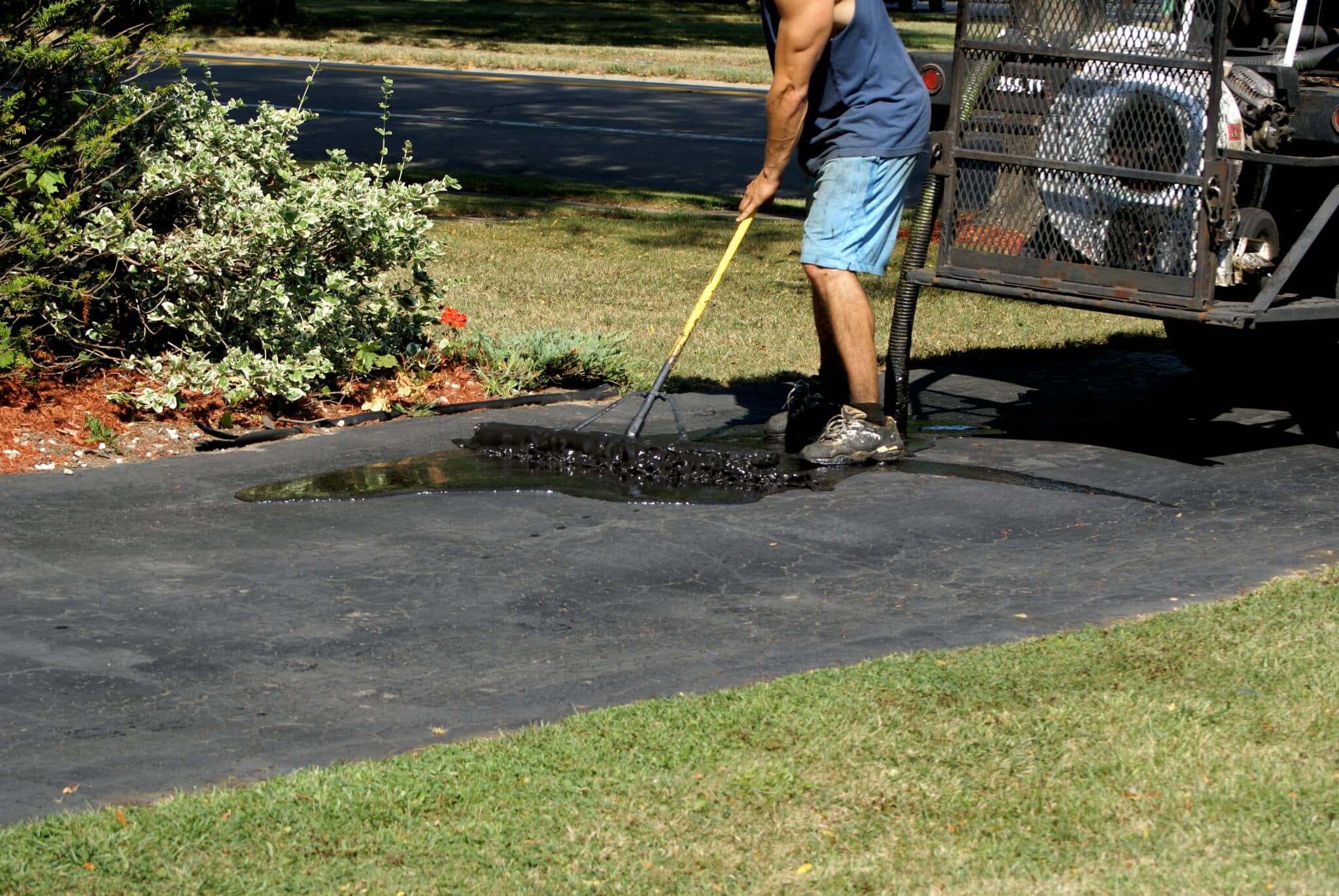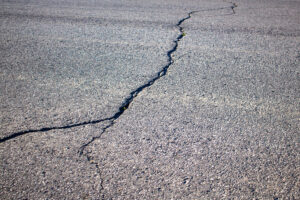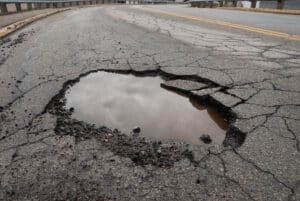Asphalt driveways, while durable and long-lasting, aren’t immune to time and weather. Cracks, potholes, and other types of damage can pop up, turning your smooth, welcoming driveway into a rough mess. With a little guidance and the right tools, you can restore your driveway to its former state, elevating your home’s curb appeal. In this guide, we’ll walk you through the step-by-step process of repairing your asphalt driveway, helping you save money and extend its lifespan.
Assessing the Damage on Asphalt Driveways
The first step of asphalt driveway repair is figuring out what type of damage you’re dealing with. Once you assess the type and extent of damage on your driveway, you’ll be able to pinpoint the best repair method. Some imperfections are easy to repair yourself, while others may require professional help. Asphalt driveways can be damaged in a few different ways, but understanding your driveway’s faults will help you find the perfect solution.
Types of Asphalt Damage
Unfortunately for homeowners, asphalt can get damaged in a variety of ways. From minor surface cracks to deep potholes, let’s take a look at the most common types of damage found on asphalt driveways.
Cracking
One of the most common culprits of asphalt damage is cracking. Cracks can appear in many forms, including longitudinal, transverse, block, and alligator cracking. If you’re unsure of the type you’re dealing with, look at the direction and shape of the cracks. If they run parallel to the driveway’s centerline, they’re longitudinal; however, if they run perpendicular, they’re transverse. On the other hand, block cracks form in a square pattern, and alligator cracks resemble the scales of an alligator’s skin. Temperature fluctuations, moisture seeping into the asphalt, and heavy loads are the most common culprits behind cracks in asphalt.
Potholes
Potholes like to make themselves known, as they’re typically large and deep depressions in the asphalt. They can form when cracks aren’t addressed and moisture reaches the subgrade layer of your driveway. Potholes typically form during freeze-thaw cycles. During these cycles, water seeps into cracks, freezes, expands, and then thaws, creating potholes in the asphalt. This damage is dangerous for vehicles and for children playing outside, so it’s best to get them repaired as soon as you notice them.
Raveling
Raveling happens when the asphalt starts to break down and the gravel starts to come loose, making the surface rough and possibly harmful to cars. This usually occurs due to low-quality asphalt, improper compacting during installation, or exposure to extreme weather.
Sinkholes
While rare, sinkholes can occur on your driveway. A sinkhole is a hole in the ground caused by the collapse of a surface layer, and it can happen due to natural ground shifts or weak subgrade layers. This type of damage can be very dangerous for vehicles and pedestrians. The good news is that sinkholes are extremely hard to miss. If you do notice a sinkhole in your asphalt driveway, get it repaired immediately to prevent any accidents.
If you’re experiencing these issues soon after installing an asphalt driveway, you may have received a bad asphalt job. However, it is common to see some of these damages years after installation. Identifying your problem is the first step in determining which repair method is right for you.
How to Repair an Asphalt Driveway
Once the type and extent of damage have been assessed, you can start with repairs. Minor damages such as cracks, small holes, and potholes can be fixed with the right tools and materials. As a homeowner, it’s important to keep these steps in mind:
Step 1: Clean the Area
For cracks and small holes, use a broom or leaf blower to remove debris, including dirt and vegetation, from the area. You should also wash the area with a hose or pressure washer.
For potholes and larger holes, Use a shovel to remove loose asphalt from the pothole and clear the base by removing any water or mud.
Step 2: Prepare the Crack or Pothole
For cracks, Slightly widen the crack with a chisel or hammer and clear out dust with a broom or blower.
For potholes, Square off the edges with a saw or chisel. Remove any debris and water from the base.
Step 3: Apply the Repair Material
For cracks, Choose a suitable asphalt crack filler and apply it using a caulking gun or pour pot; it should overfill slightly. Then, smooth the surface with a trowel.
For potholes, Choose a patch material depending on the size of your pothole; usually, a cold mix is the way to go. Pour the patch material into the pothole, filling it generously, and then compact it with a tamper.
Step 4: Seal the Driveway
Seal the driveway with a sealer of your choice to achieve a smooth and cohesive look. You can use either a sprayer or a squeegee to apply the sealer evenly. Allow 24-48 hours for the repair material and sealer to dry completely before using your driveway again.
DIY Project or Professional Help?
Deciding whether to tackle asphalt repairs as a DIY project or to hire professional help depends on the type and severity of the damage.
DIY Repairs
Homeowners can often repair minor damage, such as cracks and potholes, by following the steps above. These repairs are relatively straightforward and require basic tools and materials, making them suitable for DIY projects. However, the end result may not be as durable or long-lasting compared to professional repairs.
Professional Repairs
For more extensive damage, such as big cracks, raveling, rutting, or sinkholes, professional help is recommended. Professionals have the equipment and expertise to address these issues properly; for example, they may use hot mix asphalt on larger potholes and cracks for a more durable and long-lasting repair. Additionally, professionals can address underlying issues such as poor drainage or base material erosion, which may be hard for the average homeowner to spot.
Whether you choose to tackle asphalt repairs on your own or hire a professional, the most important thing is to address the damage promptly. Neglecting asphalt repairs can lead to more significant issues and potentially expensive repairs in the future.
The Importance of Ongoing Asphalt Maintenance
Proper asphalt maintenance can help avoid costly repairs and keep the driveway functional and attractive. Partnering with an asphalt maintenance company can help your driveway look brand new. By staying on top of maintenance tasks, you can prolong the life of your driveway and save money in the long run.
Routine Inspections
Regularly inspect the driveway for signs of damage. Small cracks and potholes can be quickly addressed before they get worse. Additionally, keeping an eye out for any changes in the driveway’s appearance can help catch underlying issues early on.
Sealcoating
Sealcoating is one of the most important maintenance tasks for asphalt driveways. This protective layer helps prevent water, oil, and UV damage to the pavement, keeping it strong and durable. After a new driveway has been paved, wait at least six months before applying sealcoating to allow the asphalt to fully cure. After this, sealcoating should be applied every 2-3 years.
Crack Filling
Cracks in asphalt can quickly spread and lead to larger issues. Fill any cracks with a quality crack filler as soon as they are noticed to prevent water from seeping in and damaging the base material.
Regular Cleaning
Keeping your driveway clean improves its appearance and helps prevent damage. Debris, oil, and other substances can break down the pavement over time if left untreated. Regularly sweep or power wash your driveway to remove any debris or stains.
Proper Drainage
Having a proper drainage system prevents water from seeping into the asphalt and causing damage. This may involve grading the driveway, installing drainage systems, or clearing debris from existing drains.
Maintaining your asphalt driveway doesn’t have to be a headache for homeowners. One effective solution to asphalt maintenance is hiring a professional asphalt repair company. Partnering with these companies can help your driveway last longer and let you breathe easier. When looking for an asphalt contractor, be sure to research their experience, credentials, and customer reviews.
Let Superior Asphalt Repair and Maintain Your Asphalt Driveway
Regular maintenance and timely repairs are the keys to preserving the aesthetics and functionality of your asphalt driveway. By following the steps outlined in this guide, you can effectively address damage and keep your driveway in top condition. For more challenging repairs, don’t hesitate to seek professional help. At Superior Asphalt, we take pride in providing top-notch materials and asphalt repair and maintenance services. Contact us today to learn more about our services and how we can help you maintain your driveway for years to come.




